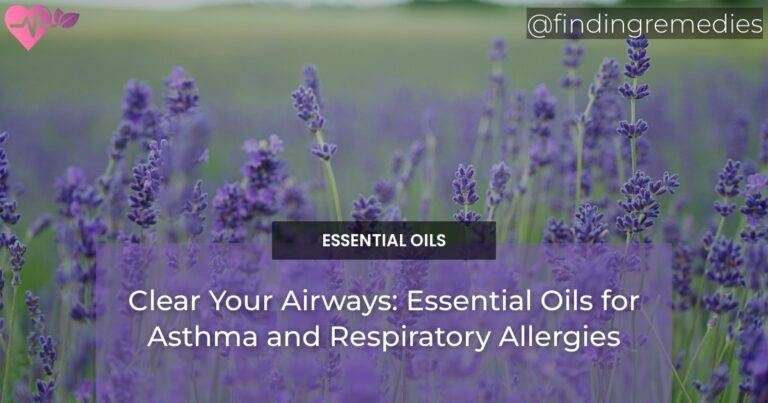Asthma and respiratory allergies can be debilitating conditions, causing difficulty in breathing and affecting the overall well-being of individuals. While there are various treatment options available, one natural and holistic approach that has gained popularity is the use of essential oils. These potent plant extracts have been used for centuries for their therapeutic properties, including their ability to clear airways and alleviate respiratory issues.
Best Essential Oils for Asthma and Respiratory Allergies
Peppermint Oil
Peppermint oil is known for its cooling and refreshing properties, making it an excellent choice for respiratory allergies and asthma. It contains menthol, which helps to relax the muscles of the respiratory tract, promoting easier breathing. Additionally, peppermint oil has anti-inflammatory and analgesic properties, which can help reduce inflammation and relieve pain associated with respiratory conditions.
Eucalyptus Oil
Eucalyptus oil is a popular choice for respiratory support due to its expectorant properties. It helps to loosen mucus and phlegm, making it easier to expel from the lungs. This oil also has antimicrobial properties, which can help fight off respiratory infections and reduce the risk of complications.
ALSO READ
Tea Tree Oil
Tea tree oil is well-known for its powerful antimicrobial properties. It can help fight off bacteria, viruses, and fungi that can contribute to respiratory infections. Tea tree oil also has anti-inflammatory effects, which can help reduce inflammation in the airways and provide relief from respiratory symptoms.
Aromatherapy for Breathing Issues
Benefits of Aromatherapy
Aromatherapy, the practice of using essential oils for therapeutic purposes, offers a range of benefits for those with breathing issues. Inhaling the aromatic compounds of essential oils can help open up the airways, reduce congestion, and relieve coughs. Aromatherapy can also promote relaxation, reduce stress and anxiety, which can further enhance respiratory function.
ALSO READ
Using Essential Oils for Congestion and Coughs
Essential oils can be used in various ways to alleviate congestion and coughs. Steam inhalation is a popular method where a few drops of essential oil are added to hot water, and the steam is inhaled. This helps to soothe the throat, clear congestion, and promote easier breathing. Another method is to use essential oils in a diffuser, which disperses the aromatic molecules into the air, providing respiratory relief.
Inhalation Techniques for Respiratory Relief
Besides steam inhalation and diffusing, there are other inhalation techniques that can provide respiratory relief. Direct inhalation, where a few drops of essential oil are applied to a tissue or cloth and sniffed, can be effective in clearing blocked noses and reducing congestion. Personal inhalers or nasal inhalers can also be used for convenient on-the-go relief from respiratory symptoms.
Applying Essential Oils for Respiratory Allergies
Diffusion
Diffusing essential oils is a popular and effective way to enjoy their benefits for respiratory allergies. Add a few drops of your chosen essential oil to a diffuser and let the aroma fill the room. This can help reduce airborne allergens, clear congestion, and promote easier breathing.
Inhalation
Inhalation is a direct and potent method of using essential oils for respiratory allergies. Add a few drops of essential oil to a bowl of hot water, cover your head with a towel, and inhale the steam deeply. This technique can provide immediate relief and help clear the airways.
Massage Techniques
Applying essential oils through massage can help relieve respiratory allergies by enhancing relaxation and promoting better breathing. Create a massage oil blend by diluting your chosen essential oil with a carrier oil, such as coconut or almond oil. Gently massage the chest, back, and neck areas to alleviate congestion and promote respiratory comfort.
Essential Oil Recipes for Respiratory Allergy Relief
Recipe 1 – Allergy Relief Inhalation Blend
- 3 drops peppermint oil
- 3 drops eucalyptus oil
- 2 drops tea tree oil
Add the essential oils to a diffuser or personal inhaler, and inhale as needed for respiratory allergy relief.
Recipe 2 – Congestion-Relieving Chest Massage Oil
- 2 tablespoons carrier oil (such as coconut or almond oil)
- 5 drops eucalyptus oil
- 3 drops peppermint oil
Blend the carrier oil and essential oils together. Massage the chest area using gentle, circular motions to relieve congestion.
Recipe 3 – Sinus Clearing Diffuser Blend
- 4 drops eucalyptus oil
- 3 drops tea tree oil
- 2 drops peppermint oil
Add the essential oils to a diffuser and enjoy the sinus-clearing benefits.
Precautions and Tips
Consultation with Healthcare Provider
Before using essential oils for asthma or respiratory allergies, it is advisable to consult with your healthcare provider. They can provide guidance based on your specific condition and ensure that essential oils are safe for you.
Dilution and Proper Usage
Essential oils are highly concentrated and should always be diluted before use. Follow recommended dilution ratios and usage guidelines to avoid skin irritation or other adverse reactions.
Patch Test for Sensitivity
Perform a patch test by applying a diluted essential oil to a small area of skin. Wait for 24 hours to check for any allergic reactions or sensitivity before using the oil more extensively.
Conclusion
Essential oils offer a natural and holistic approach to alleviate symptoms associated with asthma and respiratory allergies. Whether through inhalation techniques, diffusion, or massage, these oils can provide respiratory relief, promote relaxation, and improve overall well-being. However, it is important to use essential oils safely and consult with a healthcare provider to ensure their suitability for your specific condition. With their therapeutic properties and unique benefits, essential oils can be a valuable addition to your respiratory health regimen.

